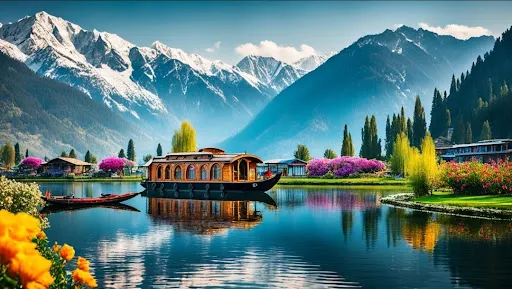In recent months, Kashmir has made headlines with its first local elections since 2014, marking a critical milestone for democracy in the region. However, beneath the surface, Kashmir continues to grapple with pressing issues that challenge its socio-political stability and economic vitality. This editorial explores the ongoing challenges of limited political power, security concerns, and economic frustrations as Kashmir attempts to find a new equilibrium.
The New Government’s Limited Scope: An Erosion of Local Autonomy
The return to local governance is a promising development, yet the reality is that Kashmir's new government is navigating significant limitations. After the revocation of Article 370 in 2019, which dissolved the region’s semi-autonomous status, the newly elected assembly in Jammu and Kashmir operates under constraints far removed from the powers held by previous governments. Control over public order, policing, and financial decisions remains firmly in the hands of the centrally appointed Lieutenant Governor, leaving the elected government to address only secondary administrative issues.
Omar Abdullah, who was elected Chief Minister, has promised to work toward economic growth and social development in the region. But there’s skepticism about how much he can accomplish without authority over critical sectors. Political analyst Siddiq Wahid describes the situation as a “metropolitan council” arrangement, where elected officials can only address day-to-day matters and must secure approval for more substantial decisions.
This lack of autonomy has deepened the trust deficit between Kashmiris and the central government. Political engagement was seen as a step toward restoring statehood, yet with this minimal authority, many Kashmiris feel that their democratic rights remain curtailed. Although the BJP government had previously promised to restore statehood "at the earliest," this has not materialized. Instead, a bureaucratic structure continues to govern much of Kashmir, a point of contention for local leaders and residents alike.
Security: A Persistent and Complex Issue
Despite political developments, Kashmir remains a security hotspot, with insurgent activities still a part of daily life. Recent incidents, such as the attacks on migrant workers and local residents, highlight the ongoing violence that disrupts communities and fuels uncertainty. The deployment of security forces has escalated, reflecting the government's concerns about maintaining order amid a challenging security landscape.
The rise in violence poses immediate threats to civilians and adds pressure on the newly elected government. With limited control over law enforcement, the administration’s ability to address these security issues is restricted, leading to concerns about its capacity to maintain peace. Observers worry that the ongoing conflict will further strain the region’s social fabric, impacting community stability and economic growth.
Economic Struggles: The Reality of Stagnation and Frustration
Kashmir’s economic landscape has been challenging for years, but the removal of autonomy and the lingering security issues have only exacerbated these struggles. High unemployment rates and a stalled economy continue to frustrate locals, especially the youth. Many residents feel economically marginalized, with bureaucratic oversight from New Delhi seen as a barrier to regional development and job creation.
Tourism, traditionally a key sector for Kashmir, has taken significant hits due to safety concerns and political tensions, affecting businesses and livelihoods. Additionally, the lack of substantial economic policy support from the central government has limited opportunities for small businesses and hindered large-scale investments. Locals report a sense of disillusionment, feeling that their economic challenges are overlooked by a bureaucracy that lacks both accountability and understanding of the region's needs.
The arrival of a locally elected government has sparked a degree of hope for renewed attention to economic development, but the restricted powers raise doubts. Abdullah’s administration is expected to focus on improving public services and addressing bureaucratic inefficiencies, yet the effectiveness of these efforts may be limited without control over major economic policies and resources. With central authorities controlling major funds and economic planning, substantial growth seems unlikely without deeper political reform.
Navigating a Path Forward
As Kashmir attempts to move forward, the region faces significant questions about the future. Can the new government effectively bridge the gap between Kashmiris and the central administration? Will security improve sufficiently to allow economic growth? And will the promise of restored statehood be realized? These uncertainties weigh heavily on the people of Kashmir, who have endured decades of conflict and instability.
The road ahead requires collaborative efforts and trust-building measures. The central government’s willingness to genuinely empower the new assembly and support local development initiatives will be essential. Additionally, greater regional autonomy and responsiveness to Kashmir’s unique socio-economic needs could foster both peace and prosperity.
For now, the people of Kashmir remain hopeful but cautious, as they await visible change from their elected leaders and a commitment to empowerment from New Delhi. The future of Kashmir lies in balancing regional identity with integration into the broader Indian framework—a delicate task that demands both political will and understanding.

